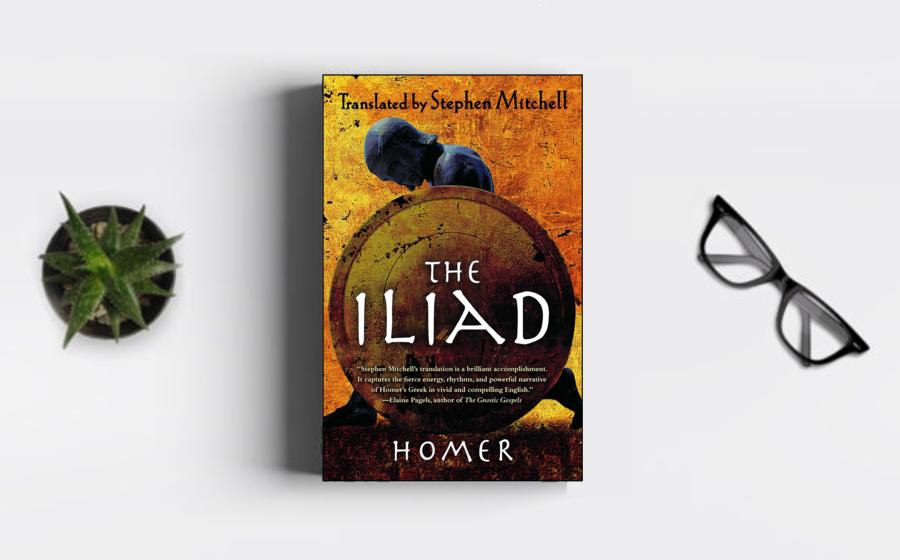"The Iliad," attributed to the ancient Greek poet
Homer, stands as one of the most enduring and
influential works of literature in the Western canon.
Composed in the 8th century BCE, this epic poem has
transcended its historical origins to become a
time-tested masterpiece that resonates with readers
across cultures and centuries. "The Iliad" explores the
complex interplay of fate, honor, and the human
condition against the backdrop of the Trojan War,
offering profound insights into the nature of heroism
and the enduring struggles of humanity.
At the
heart of "The Iliad" is the epic hero Achilles, a figure
whose character and exploits embody the timeless
qualities of heroism. The poem begins with the wrath of
Achilles, sparked by a perceived slight to his honor,
setting the stage for a narrative that explores the
consequences of unchecked pride and the pursuit of
glory. Achilles, a warrior of unparalleled skill and
courage, becomes a symbol of the hero's journey and the
complexities inherent in the pursuit of greatness.
One of the reasons "The Iliad" has stood the test of
time is its exploration of the multifaceted nature of
heroism. While Achilles possesses extraordinary physical
prowess and martial skill, Homer does not shy away from
depicting the hero's vulnerabilities, internal
conflicts, and moral dilemmas. Achilles grapples with
the inevitability of his own mortality, the impact of
loss, and the choices that shape his destiny. This
nuanced portrayal challenges conventional notions of
heroism, presenting a more complex and humanized vision
of the epic hero.
The epic's exploration of fate
and the divine further contributes to its enduring
appeal. The intervention of the gods in the affairs of
mortals adds a layer of cosmic significance to the
narrative. The whims of the Olympian deities, their
alliances, and conflicts mirror the unpredictable nature
of human existence. "The Iliad" prompts readers to
reflect on the interplay between fate and free will,
destiny and choice, underscoring the enduring questions
that have occupied human thought throughout the ages.
The theme of honor, a cornerstone of ancient Greek
culture, permeates every aspect of "The Iliad" and
contributes to its time-tested status. Honor, or "time"
in Greek, is a precious commodity earned through deeds,
and Achilles's obsession with securing his kleos (glory)
and maintaining his honor becomes a driving force in the
narrative. The consequences of honor, both in its
attainment and its loss, become a profound reflection on
the human pursuit of recognition and the sacrifices made
in its name.
The portrayal of war and its human
cost is another element that ensures "The Iliad" remains
a timeless epic. The brutal and visceral depiction of
the Trojan War, the horrors of battle, and the toll of
loss and grief serve as a stark reminder of the human
condition. Homer's vivid descriptions of the
battlefield, the clash of armies, and the individual
tragedies of fallen warriors transcend the specific
historical context of the Trojan War, resonating with
the universal experience of conflict and its impact on
humanity.
The relationships between characters,
particularly the camaraderie between Achilles and
Patroclus, contribute to the emotional depth of the
epic. The bond between these two warriors, transcending
friendship and bordering on kinship, adds a layer of
tragedy to the narrative. The loss of Patroclus becomes
a catalyst for Achilles's transformation and sets the
stage for the exploration of grief, vengeance, and the
enduring impact of personal connections in the face of
war's brutality.
The epic's use of similes,
metaphors, and rich poetic language elevates it beyond a
mere historical account, contributing to its enduring
literary appeal. Homer's mastery of language and imagery
enhances the emotional resonance of the narrative,
allowing readers to immerse themselves in the sensory
and emotional experiences of the characters. The beauty
and power of the language contribute to the lasting
impact of "The Iliad" as a work of art that transcends
its utilitarian function as a record of historical
events.
The oral tradition in which "The Iliad"
was initially composed and transmitted is another factor
in its time-tested status. Originally recited by bards
or rhapsodes in public performances, the epic's rhythmic
cadence and oral poetry facilitated its memorization and
dissemination across generations. The communal nature of
these performances allowed the epic to become a shared
cultural experience, fostering its preservation and
ensuring its continued resonance in the collective
memory.
The enduring influence of "The Iliad" on
subsequent literature and art also contributes to its
time-tested epic status. Countless works of literature,
drama, and visual arts have drawn inspiration from the
characters, themes, and narrative structure of Homer's
epic. The echoes of "The Iliad" can be found in works as
diverse as Shakespeare's tragedies, Virgil's "Aeneid,"
and contemporary adaptations in film and literature. The
epic's themes of heroism, fate, and the human condition
continue to reverberate through the ages, attesting to
its enduring impact on the cultural imagination.
"The Iliad" remains a time-tested epic of unparalleled significance, exploring the complexities of heroism, the capricious nature of fate, and the enduring struggles of humanity. Through its nuanced portrayal of Achilles, the exploration of honor, the cosmic dimensions of fate, and the visceral depiction of war and its aftermath.






